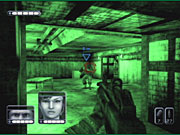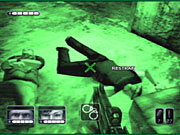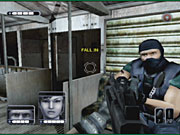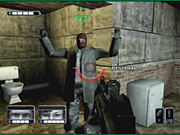Watching the evolution of a video game series over a period of years can be pretty fascinating. SWAT: Global Strike Team, for instance, is very much a sign of the times. Global Strike Team is a new offshoot of the original SWAT series, a long-running line of police strategy games for the PC that was itself an offshoot of the original Police Quest adventure game series that started in the late 1980s. While the original games were of a plodding tactical nature, this newest SWAT game takes its cues from recent action-oriented fare like Rainbow Six and Counter-Strike. Global Strike Team features solid squad-based gameplay, and it introduces a pretty interesting new mechanic that fits into the game's context of law enforcement. Though some of the attempts at realism are a little baffling, the game should be quite entertaining and a good play for fans of tactical, real-world first-person shooters.

In the game's near-future setup, terrorism and threats to law-abiding civilians have escalated to the point that an international peacekeeping police force has been formed. This is, of course, the Global Strike Team, and the game places you in command of three of its members: Kincaid, the trio's leader and all-around tough-as-nails combat grunt; Jackson, the tech specialist who will defuse bombs and hack computers in addition to providing combat support; and Lee, the sharpshooter who's handy with the business end of a sniper rifle. You'll spend the majority of your time playing as Kincaid, leading missions and commanding the other teammates, but occasionally the game will change up the action. For instance, you'll occasionally switch from Kincaid to Lee, who's in a different part of a level providing cover fire, and you'll have to dispatch a few bad guys from afar before you can switch back to playing Kincaid again.
The main single-player campaign in SWAT: Global Strike Team is pretty straightforward. You play through a linear progression of more than 20 missions that take place in a variety of hostile locales around the world. You'll go everywhere from a besieged bank in Los Angeles to an old industrial complex in the former Soviet Union, and your mission objectives will have you tracking down key suspects, saving trapped civilians, and disarming bombs--basically everything you'd expect a crack team of international police to do. The game does a good job of spreading the locations and objectives around so you don't feel like you're doing the same thing over and over.

In a tactical shooter, the linchpin of the game experience is in fact the shooting part, and in this area Global Strike Team does a good job. Before each mission you're allowed to select three weapons: lethal, nonlethal, and grenade. Unlike some realistic shooters, SWAT: GST doesn't bombard you with more weapon choices than you can handle. In the lethal category, you've got a handy assault rifle, a machine gun, a shotgun, and occasionally a sniper rifle to pick from, while a tranquilizer pistol is your standard nonlethal sidearm. Available grenades include concussion, flashbang, and EMP. GST makes up for the limited selection of main weapons by allowing you to upgrade these weapons as you progress through the game. You'll earn upgrade points based on your performance in the single-player missions, and these points can purchase larger magazines, recoil dampeners, more-powerful ammunition, and better targeting apparatuses for your existing weapons.
Once you're in a mission, the gameplay is of a pretty straightforward run-and-gun nature. You proceed through a map with one or both of your teammates at your side and attempt to complete the objectives while making no more mess than you have to. Thankfully, you won't be alone in your struggle, as the game's teammate AI is usually quite good at keeping up with you and will sometimes actually beat you to the punch in neutralizing hostiles. Furthering the realism, Global Strike Team has a feature that's quickly becoming de rigueur for tactical first-person shooters: voice command recognition. You can use the Xbox Live headset on the Xbox, or a SOCOM-compatible USB headset on the PS2 to verbalize commands to your teammates. This is by no means required, as you can issue the same commands with the D pad, but actually speaking to your teammates and having them do what you say certainly adds to the immersion factor. The game is generally pretty good at understanding what you say, and you can try out a number of keywords for each command to see which one works best for you.

The aforementioned unique game mechanic in Global Strike Team has to do with your role as a police officer. Since you're bound by the law, you can't simply go into a mission with guns ablaze and indiscriminately mow down everything that moves. Of course, killing civilians will result in a severe penalty, but in an interesting twist that you won't see in many such games, you also can't kill armed enemies that aren't actively threatening you. Once a suspect is displaying violent intent, you're free to waste him, but if you sneak up on an unsuspecting punk and pop him in the head, you're violating procedure. In fact, you're encouraged to take as many suspects alive as you can, and to do this you'll have to intimidate the bad guys into surrendering. When you line up an enemy, you'll see a meter that displays how close they are to giving up, and this meter increases a little bit when you yell at them to get down (either with a button or the voice command) and a lot when you shoot them. On the one hand, it's definitely cool that you can actually force your enemies to surrender; it makes them seem more like real people rather than mindless AI constructs that shoot at you until you kill them. On the other hand, you usually have to shoot someone at least a couple of times before they'll lay down their weapons. You'd expect a couple of slugs to the chest to lay a guy out rather than make him throw up his hands in surrender, but other than this slightly unrealistic aspect, the surrender-and-restraint system in SWAT: GST works well.
In terms of presentation, SWAT: Global Strike Team makes a good if slightly uninspired effort. The levels are for the most part varied and nicely built, although some of them feature enough similar-looking corridors that you can lose your bearings at times. The player models are all serviceable and animate pretty realistically. As you'd expect, the Xbox version is noticeably better looking than its PS2 counterpart. It features graphical niceties such as better lighting, bump-mapping, and surface highlights, and its frame rate is generally a lot higher. Unfortunately, the game's PS2 roots are evident in its basic art assets--its characters and levels, in other words--so it doesn't look as good as recent, similar games like Rainbow Six 3. The PS2 game also looks good, though it's more basic. You won't get the Xbox graphical extras, and the frame rate is definitely lower in places, but otherwise it keeps pace pretty well. SWAT's sound effects are quite good in-mission, and you'll hear a lot of solid environmental effects providing a backdrop for the gunfire and yelling enemies. You'll hear a lot of other voices through radio transmissions and before-mission briefings, and these are sometimes good and sometimes really poor, especially when they're trying to imitate a foreign accent. Finally, SWAT's music is surprisingly appropriate to the game and blends in well with the goings-on.
If you like what you find in Global Strike Team during your initial play, there's a pretty high amount of replay value that will keep you coming back. You can play several of the game's maps in cooperative mode, and these are especially appealing because though they take place in the same locations you saw in the single-player campaign, the actual missions are entirely different. There are also six four-player competitive modes, such as deathmatch, last-man-standing, and kill-the-man-with-the-ball, although these can only be played on one console since no online play is supported in either version. Xbox players will be able to download extra content in the future, however.
SWAT: Global Strike Team is an impressive and successful effort to bring the old series into the 21st century. Fans of other tactical shooters will definitely find more of their favorite genre to like here, and the new police-style mechanics give the missions a differently paced feel from games that encourage you to always shoot first and ask questions later. The presentation and setting aren't always quite up to par, but that's forgivable when the game's underlying action is so solid.
